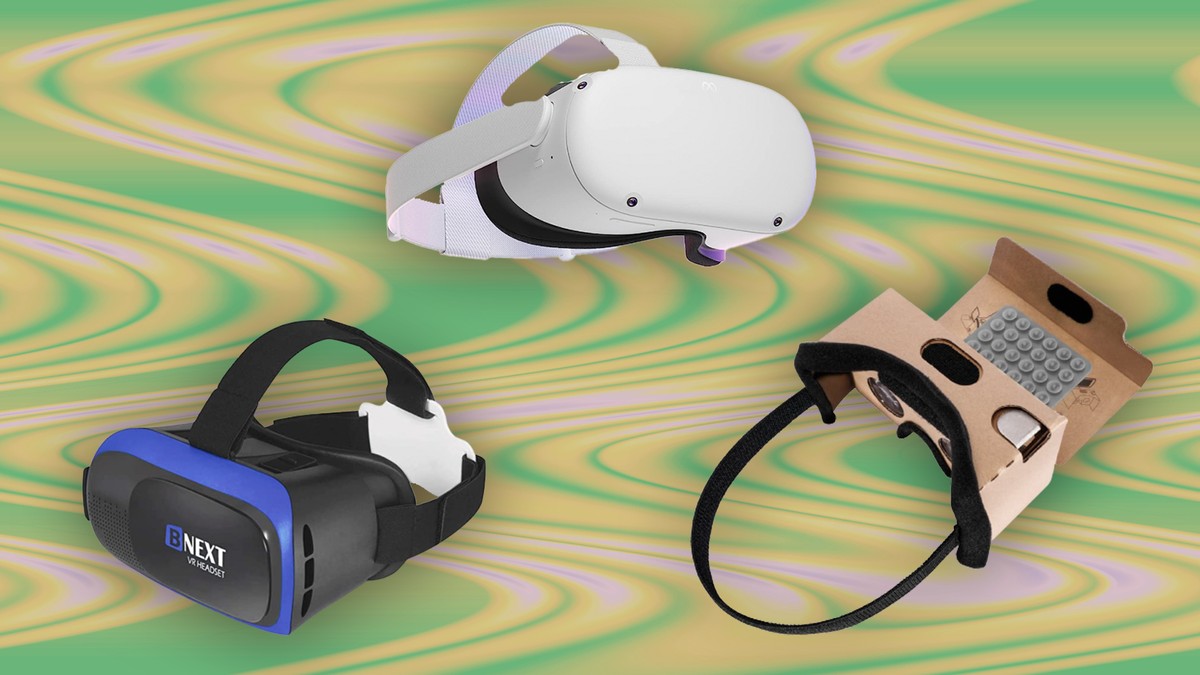Metaverse this, VR at—we’re living in one hell of a technologically advanced future, but at a time when AI and digital worlds are more approachable than ever, how do we discern what’s real and what’s just a jumble of buzzwords? Speaking on virtual reality (VR) specifically, it’s—according to the almighty Merriam-Webster dictionary—“an artificial environment which is experienced through sensory stimuli (such as sights and sounds) provided by a computer and in which one’s actions partially determine what happens in the environment.” In practical terms, this is accomplished by entering into a digital space via a headset (often with other accessories). This gives users the ability to view and/or move around in a digital space in a way that mirrors how humans see and visually experience things IRL. With the proliferation of places like Meta’s Metaverse and the rise of VR functionality in video games, the idea of owning a VR set makes more sense than ever (even if it’s still a novelty to most).
Naturally, this kind of tech (historically speaking, anyways) isn’t super affordable—especially when it comes to big name tech firms or models with advanced features. Case in point? Apple’s recently unveiled Apple Vision Pro retails for a cool $3,500. That said, if you’re interested in taking a chance on a VR headset, the proliferation of the technology needed to visit digital worlds isn’t as out of reach as it might have been even a half decade ago. While plenty of well-known brands have created their own VR headsets, there’s a variety of models that give users the option to tap into accessible VR technology (or, at least, the power of their personal smartphone) without costing as much a monthly rent payment. You all should know by now that we’re bargain hunters here at VICE, so we got the inside scoop on where to snag the most affordable and cheap VR headsets. Time to transport ourselves into oblivion.
Meta Quest 2
At just under $300, the higher-end model on our list is the Meta Quest 2. Given that Mark Zuckerberg is one of the biggest advocates for the “Metaverse,” it makes sense that his brand’s VR headset would pack in some key features. Experience a thrill with a super-fast processor, high-resolution display, immersive audio, hand tracking, and haptic feedback (effectively tech that relies upon and recreates the sensation of physical touch or feedback). The headset is wireless, has a built-in battery, and, fortunately, doesn’t require a PC or console. Unlike other VR headsets, there’s plenty of different programs and experiences you enjoy with Meta’s headset; with over 250 game titles, fitness programs, and movies available to choose from, you can scare yourself shitless during an immersive viewing of The Exorcist or take that workout to the next (digital) level. Yes it’s more expensive than some of the other headsets on this list, but its features should help justify the price (at least when compared to the more pared-down or DIY models that appear later on in this list).
BNEXT VR Headset
In our opinion, one of the standout features of the BNEXT headset is it can support drones—hell yeah. Get up close and personal with what’s in the sky with its smartphone compatibility and wide field of vision. It comes with a free VR content list of games and other experiences, along with a fully adjustable head strap, eyesight protection system, and a soft nose piece to reduce pressure—all for under $20. “I’ve enjoyed watching VR videos from amusement park rides; you don’t usually get a 360-degree view while riding a roller coaster, but with this you do,” one review on Amazon said.
Topmaxions VR Headset
For those looking to save major moolah (or just have a DIY approach to tech), this headset by Topmaxions is a doppelganger of Google Cardboard. While that discontinued Google device was a handheld headset made out of… well, cardboard (duh), this version (complete with a headset strap) powers a VR experience using smartphones that fit 3.5″-6.0″. The best part? It’s under $10 Stripped down and non-bulky, it connects to your phone via suction cups.
Atlasonix VR Headset
This model by Atlasonix caters to Android devices (take that Apple) with remote control, but also works with all mobile devices with 4”-6.3” screens. The 3D headset adjusts for optimal viewing angles and proper alignment, meaning users should have reduced distortion while viewing over 300 compatible games and apps; this is on top of the special VR content that’s accessible via a QR code. Other features include an adjustable head strap, eyesight protection, and a soft nose piece to reduce pressure.
BRB, we’re heading to virtual Kmart.
The Rec Room staff independently selected all of the stuff featured in this story. Want more reviews, recommendations, and red-hot deals? Sign up for our newsletter.

